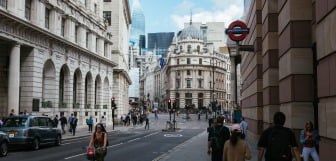Bank of England Raises Interest Rates to 3%
Today, the Bank of England announced that interest rates will rise to the highest level in more than 40 years. This has stoked fears of the UK moving into a recession.
The latest news: in brief
Here are the latest developments:
- The Bank of England has raised interest rates by 0.75% from 2.25% to 3%.
- The 0.75% rise comes off the back of a 0.5% rise last year and is the eighth consecutive hike to interest rates since December of last year
- Alongside this rise, unemployment is expected to double by the end of the recession, which is forecast until 2025
- Prime Minister Rishi Sunak will release a plan later this month, hoping to combat the recession, which will likely mean reduced spending and a series of tax rises.
What’s happening to the UK economy
A recession can only be declared when an economy shrinks in two successive quarters (or six months). The UK economy has been in a period of “stagflation,” which is where the economy struggles to grow at the same time that inflation is high.
This year has seen the pound take several damaging blows at a time when stability has been needed as businesses adapt to the changes in the economy. Food and energy shortages have had a continual impact. An unfunded budget from former PM Liz Truss caused an additional, unexpected blow that new PM Rishi Sunak needs to address.
As a result, the Bank of England has raised interest rates again, this time at a record level, bringing borrowing costs to their highest point in 14 years.
Predictions of higher unemployment will only further consumers' hesitancy to spend, with students finishing university now likely to struggle to find employment. But by discouraging spending and borrowing, the Bank hopes to ease prices, creating a more stable economy that might begin to recover.
What the Bank and others have said
Andrew Bailey, Governor of the Bank of England, has declared Britain has a “tough road ahead.” The BBC reported, "While it will not be the UK's deepest downturn, it will be the longest since records began in the 1920s.”
Two months ago, Bailey declared, "Returning inflation to its 2% target remains our absolute priority, no ifs, no buts”. Today’s monetary policy report detailed the rise to 3%, with an accompanying prediction that “We expect inflation to fall sharply from the middle of next year.”
Chancellor for the Exchequer Jeremy Hunt has advised, "The most important thing the British government can do right now is to restore stability, sort out our public finances, and get debt falling so that interest rate rises are kept as low as possible."
These statements show that the government is focusing on helping the pound recover to more competitive levels.
Labour’s shadow chancellor Rachel Reeves said this will be difficult for families to manage "when we've got rising food prices, rising energy bills and now higher mortgage rates as well".
What do higher interest rates and a recession mean?
Higher interest rates are grave news to those with mortgages. Banks regularly renegotiate mortgage rates as initial agreements are subject to changes in the economy over a long period.
Consequently, when interest rates rise, the economy takes a hit as homeowners and businesses are forced to spend more on mortgages. With overall spending down, businesses are likely to struggle.
How Epos Now can help your business
Epos Now continues to support businesses with our low prices and zero upfront costs.
Epos Now also offers a new service, Epos Now Capital, which offers financial aid, business loans, and advice to those looking to find investment opportunities or funding.
If you’re concerned about this news, don’t hesitate to contact:
The Federation of Small Businesses (FSB)[1]: A non-profit organization providing business services and advice
Citizens Advice [2]: A charity networking with other local and national services which provides advice and support to all UK citizens
Business Debtline[3]: A charity dedicated to providing debt advice to small businesses across the UK
Check out our most recent guides to help you manage any financial difficulties:
How to Adapt and Thrive as a Small Business in a Cost of Living Crisis
10 Ways to Economize Amid Rising Energy Prices
Getting Help if Your Retail Business Can’t Afford its Energy Bills
Getting Help if Your Hospitality Business Can’t Afford its Energy Bills
5 Ideas to Promote Your Hospitality Business When Consumer Spending is Down
How to Protect Your Retail Sales Amid Rising Inflation
Everything You Need to Know About the Government-Backed Recovery Loan Scheme



